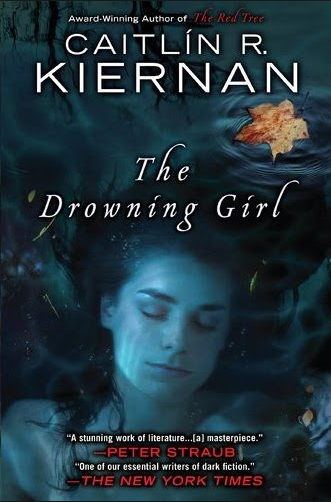A Narrator Who’s Haunted By a Ghost—Or Is She?
 Editor’s note: Joel is reading his way through the finalists for the 2012 Nebula Award for best sci-fi/fantasy novel. Read his introduction here.
Editor’s note: Joel is reading his way through the finalists for the 2012 Nebula Award for best sci-fi/fantasy novel. Read his introduction here.
Cailin R. Kiernan’s The Drowning Girl is, on its face, perhaps the most interesting of the books nominated for the Nebula Award this year, because it isn’t technically a sci-fi or fantasy book. Or maybe it is a fantasy, but only technically.
It’s the first-person account of India Morgan Phelps (who goes by Imp), who believes she is being haunted by the ghost of the woman in a famous painting called The Drowning Girl. But here’s the thing: Imp is admittedly crazy—paranoid schizophrenia probably doesn’t begin to cover it—and on and off her meds as she writes down a story she never intends for anyone to read. There are no outside observers to confirm or deny anything we’re seeing, and Imp’s indifference to narrating events in a linear fashion (she isn’t writing this for you, after all), means the story is both impossible to trust and very difficult to follow. So is it really a fantasy novel? Are delusions real? Is Imp actually being haunted?
This is where I would normally sketch out the plot of the novel, because that’s as good a way as any to let you know if it’s the kind of thing you might want to read. But I’m kind of at a loss this time. The Drowning Girl most definitely has a plot, but it is stitched together from random memories, some of them real (I think), some of them intentionally fabricated (as Imp reveals, sometimes a hundred pages later, ever the unreliable narrator), some of them contradictory, all of them ephemeral. What this book is really about is the exploration of a damaged mind, and of the power of an idea—what Imp calls a haunting, or a “pernicious meme”—to take hold and not let go. It explains doomsday cults where everyone drinks the Kool-Aid, or the enduring infamy of sensational unsolved murder cases like the Black Dahlia (a touch point for Imp): ideas can worm their way inside of us, creating an infection as damaging as any disease. At one point, Imp worries her own text, if ever discovered, might similarly haunt its readers. I’d say the feeling is more like having bugs crawling around inside your head.
Imp is a frustrating, fascinating narrator, obsessive and manic and unlikeable and broken. She feels utterly real, even as she shares with us her most unreal narrative. Her story is maddening, mazelike, and not for every audience (body trauma abounds; at one point Imp explores an entire museum’s worth of artwork inspired by a grisly murder). Sexuality is a key theme; Imp is a young lesbian in a mutually destructive relationship with a transgendered woman. So is literary experimentation: Imp writes macabre short stories littered with wolves and mermaids (two of which are included in the text in full, and are strong enough that they could stand on their own), and some chapters are stream of consciousness rants or windows into her obsessions and delusions. It’s all masterfully done, with a wealth of detail that will have you running to Google to read more about art history (sorry, the titular painting and its artist are authorial creations).
It’s a bit strange to close the covers of a book and have no idea if you liked what you just read. Weeks later, I’m still not quite sure, but I can say with confidence that The Drowning Girl is one of the most unforgettable books I’ve read in years.
Why was it nominated? Simply put, the writing is stunning—there are some very well-written books on the Nebula ballot this year, but The Drowning Girl blows past all of them simply on a sentence-by-sentence level. Kiernan pulls you inside a confused, paranoid mind and keeps you there through the course of the novel, unsure what you can trust and when you are being deceived.
Does it have a shot at the Nebula? As impressive as it is, The Drowning Girl isn’t exactly what I would call an “enjoyable” experience. It is compelling, harrowing, mesmerizing, and, yes, haunting, but never easy, let alone fun. It is a difficult book, and hard to love, and that might hurt its chances in the voting. But that also might be why it truly deserves to win.